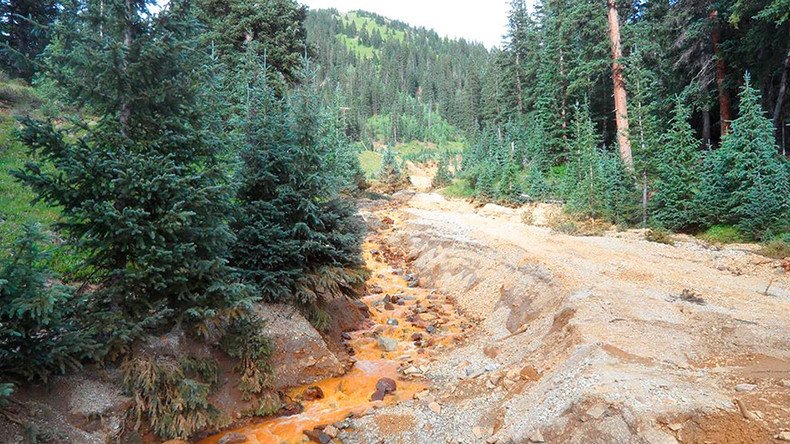New Mexico planning to sue the US government over toxic Colorado mine spill

New Mexico has signaled that it will sue the federal government, along with the owners of two Colorado mines, for a massive spill of 3 million gallons of toxic metals into the Animas River. The spill contaminated rivers and agricultural lands in four states.
New Mexico made its intent to sue known in papers filed on Thursday claiming the government had created “an imminent and substantial endangerment to the health of New Mexico’s citizens and the environment of the Animas and San Juan Rivers,” the Associated Press reported.
Colorado mine spill three times worse than first reported - EPA http://t.co/LOgP16umhdhttp://t.co/hx9tRGhpFG
— RT America (@RT_America) August 11, 2015The notice targets the US Environmental Protection Agency and the Bureau of Land Management, as well as the Gold King and Sunnyside Mines, whose waste polluted the Animas and San Juan rivers on August 5, 2015.
“From the very beginning, the EPA failed to hold itself accountable in the same way that it would a private business,” Ryan Flynn, cabinet secretary of New Mexico’s environment department, said in a statement. “The EPA caused an unprecedented disaster that may affect our state for years to come; they must take responsibility.”
New Mexico irked, threatens to sue EPA, Colorado over Gold King: https://t.co/hAWr91fnVh by @finleybrucepic.twitter.com/Aij5vi8BQD
— The Denver Post (@denverpost) January 15, 2016An EPA cleanup crew at the Gold King Mine, Colorado accidentally set loose 3 million gallons of toxic mine sludge and wastewater containing the heavy metals arsenic, lead, cadmium, copper, mercury and zinc. The accident contaminated rivers in Colorado, Utah and New Mexico, briefly shutting down drinking water supplies and raising alarms over the spill’s potential long-term effects on agriculture.
Photographs taken in the aftermath of the spill showed a mustard-colored plume in the rivers.
Specifically, the waste travelled through the Animas Valley, into New Mexico and the San Juan River, forcing farmers and municipalities to shut off water supplies at thousands of drinking water wells, including some as far as 100 miles away. Farmers and ranchers on the Navaho Nation were left without a water source for their crops and livestock for weeks.
Flynn said that the state had no choice but to sue because the EPA had shirked its duties. The notice asks the EPA “to take meaningful measures to clean up the affected areas and agree to a long-term plan that will research and monitor the effects of the toxic spill.”
Colorado mine owner accuses the EPA of lying in Capitol hearing [VIDEO] https://t.co/jdBCzfsDip@anyaparampil
— RT America (@RT_America) September 12, 2015The EPA told the AP that it is reviewing New Mexico’s plans to sue.
“EPA is working closely with the states to develop a long-term monitoring plan to evaluate potential environmental impacts from the spill and will be meeting with representatives in early February,” spokeswoman Christie St. Clair said. “EPA is also reimbursing state and local agencies for response-related costs associated with the spill.”
Although the EPA had claimed that the spill was “likely inevitable," the results of an investigation conducted by the Department of the Interior’s Bureau of Reclamation, which were released in October of 2015, found that the Environmental Protection Agency was solely to blame for the spill.
EPA caused the Colorado gold mine spill, government investigators report
https://t.co/gBAkIsw7Yopic.twitter.com/GDSJaJJCVm
— RT America (@RT_America) October 23, 2015Hasty operations by the EPA were the sole cause, the Interior report concluded. The Gold King Mine burst because the EPA had neglected to check its water levels before excavating the already weakened mine entrance. Though the EPA had acknowledged some risk of a blowout in June 2014, the dangers had been building for decades. Despite the fact that mining companies had redirected water flow through the mines, causing it to build up, Interior officials say the spill could have still been avoided if the EPA had done its due diligence.












